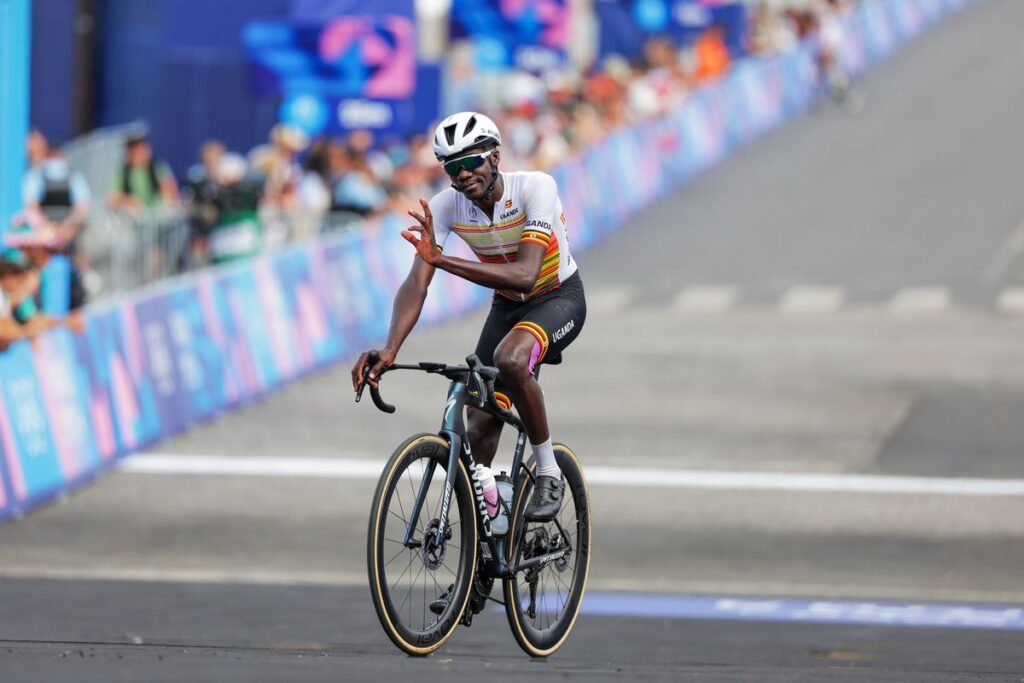Half an hour after Remco Evenepoel (Belgium) celebrated his historic victory in the Paris Olympic Games road race, Charles Kagimu lit up the arena at the Trocadéro in Paris, rolling in as the last finisher of the 273km race. The crowd were genuinely appreciative of the 25-year-old’s scrappy ride in the day’s early breakaway and his fight to write his name into history as the first Ugandan Olympic cyclist in 40 years.
Kagimu is no stranger to epic racing, having completed a brutal edition of the Unbound Gravel 200 last year with Team Amani, but the Olympics were another level of intensity with streets packed 10-deep with screaming fans. The atmosphere inspired Kagimu to fight through the major setback of falling seriously ill after the opening ceremony.
“After the opening ceremony, I was really sick. I had a really bad flu and on Saturday I literally couldn’t get out of bed. So being here and being able to finish the race is such a huge accomplishment,” Kagimu told Cyclingnews.
The illness wasn’t the only challenge Kagimu faced heading into the Olympics. He didn’t have a proper bike to race on, but the Ugandan Olympic Committee presented him with a new Specialized Tarmac S-Works SL8 just before the Games. Getting used to a new bike so close to the race he said presented “a few challenges” but he made the most of it, spending near 190 kilometres off the front in the day’s first attack.
Kagimu, the African Games time trial winner, went on the attack almost from the flag drop, making the early breakaway with Eric Manizabayo (Rwanda), Thanakhan Chaiyasombat (Thailand), Christopher Rougier-Lagane (Mauritius) and Achraf Ed Doghmy (Morocco). The group gained up to 16 minutes on the main peloton before finally being joined by a counter-attack containing Elia Viviani (Italy), Ryan Mullen (Ireland), and Georgios Bouglas (Greece).
The peloton finally came to life with the new attack and the pace in the breakaway also rose, kicking Manizabayo, Chaiyasombat and Doghmy out of the move. Still, Kagimu held on until around 90km to go.
“We knew the good guys would catch us so it was nice to have a head start and do our own pace on the front,” said Kagimu. “After the guys caught us the pace was quite high and I decided to ride my own pace.”
“It was really mind-blowing to see such crowds – the last time I saw such crowds was in Glasgow and in Rwanda. So it was nice to see to have such crowds and they just gave me a lot of motivation to finish the race.”
Because of the drive to have equality between the men’s and women’s fields at the Olympics, the UCI drastically reduced the size of the teams for the men’s race compared with previous years, with a maximum of four riders per team and only 90 starters. It’s a big hit for most of the top pros but Kagimu is firmly in favour of the format, so much so that he isn’t even looking forward to the UCI Road World Championships in Rwanda next year because he would be racing alone against teams of eight riders.
“I’m not really a huge fan of doing the World Championships, given the nature of the race. Here, it was really nice to have guys ride at the front because it’s easier to ride away if you are weaker teams,” said Kagimu.
“Also, it was quite hard for all the other teams to control the race. But the World Championships have a different format. You have teams which are around eight riders starting the race. So yeah, for me doing the road race starting alone doesn’t really make sense, tactically.”
The Olympic format gave riders like Kagimu a fighting chance, and despite his illness and last-minute adjustments to a new bike, he and his breakaway companions made the most of it.

